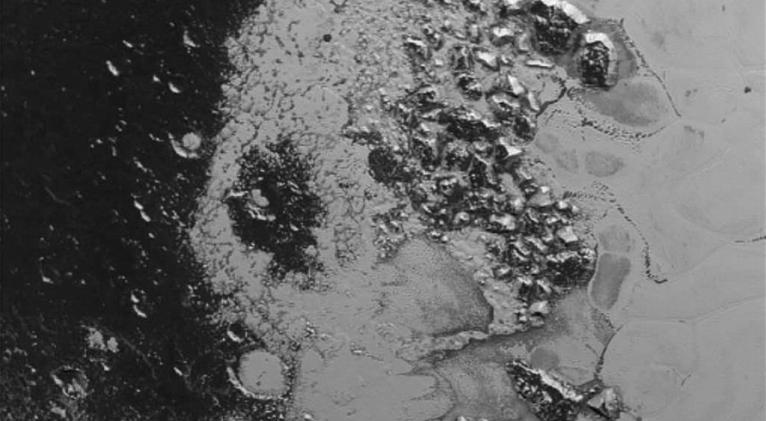A 2nd totally different mountain range discovered on Pluto, scientists baffled (PHOTOS)
especiales

The New Horizons mission said the mountains had been found on the lower-left ledge of Pluto’s heart-shaped Tombaugh Regio area.
The mountains are from 1 to 1.5 kilometers high and are comparable with the Appalachian Mountains in the US, and the Altai range in Russia.

READ MORE: Mystery terrain in Pluto’s icy ‘heart’ revealed in latest New Horizons close-up image
It comes a week after the first range, dubbed The Norgay Montes (Norgay Mountains), was discovered by the mission. The mystery for the scientists is the dramatic differences between the two ranges, despite them being situated just 110 kilometers apart.
“There is a pronounced difference in texture between the younger, frozen plains to the east and the dark, heavily-cratered terrain to the west,” Jeff Moore, leader of the New Horizons Geology, Geophysics and Imaging Team (GGI), said, as quoted in the official press release.
“There's a complex interaction going on between the bright and the dark materials that we're still trying to understand,” Moore added.
This could be explained by the fact that bright spots are geologically younger, less than 100 million years, while the darker areas could date back billions of years.
These latest high-res images of Pluto were acquired by the Long Range Reconnaissance Imager (LORRI) on July 14 from a distance of 77,000 kilometers, and sent back to Earth on July 20.

READ MORE: NASA finds own ‘Mordor’ at Pluto’s moon Charon
Among other latest findings are new images of Pluto’s second and third moons: Nix (42 kilometers in length) and Hydra (55 kilometers).
Nix is grey and jellybean shaped. However, it has a bright red zone that some scientists think is a crater.
“Additional compositional data has already been taken of Nix, but is not yet downlinked. It will tell us why this region is redder than its surroundings,” mission scientist Carly Howett told the Telegraph.
“This observation is so tantalizing, I'm finding it hard to be patient for more Nix data to be downlinked,” she also said.













Add new comment